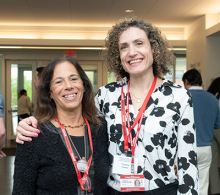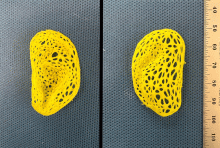
Astrocytes Induce Sex-Specific Effects on Memory
May 30, 2024
Weill Cornell Medicine scientists have uncovered the first evidence that astrocyte receptors can trigger opposite effects on cognitive function in male and female preclinical models. The findings point to astrocytes, brain cells that support and regulate neurons, as key contributors to sex-specific brain mechanisms.

Building a Non-Pharmacological Treatment Option for Chronic Pelvic Pain
May 22, 2024
M.Eng. student team works with Weill Cornell Medicine physician-inventor to make an intravaginal electrical stimulation device for pelvic pain.

Cornell's Meinig School Hosts the Eighth-Annual Industry Engagement Day and Project Showcase
May 15, 2024
On Friday, May 10, the Meinig School of Biomedical Engineering at Cornell University hosted the eighth-annual industry engagement day and project showcase for its Master of Engineering (M.Eng.) students. The day-long event brought students together with faculty, alumni and professional attendees to connect with the breadth of talent in the school’s M.Eng. program. Participants included industry sponsors West Pharmaceutical, BD, Baxter, and Med Dimensions, as well as physician attendees from Weill Cornell Medicine and program alumni from Hospital for Special Surgery.
GoT-ChA: A New Tool for Detailing How Gene Mutations Affect Cells
May 8, 2024
A team co-led by researchers at Weill Cornell Medicine and the New York Genome Center has developed an advanced method for revealing how gene mutations disrupt the normal packaging of DNA. These structural changes, which alter patterns of gene activity in a cell, are known as epigenetic changes and can lead to malignancy.
Daedalus Fund Aims to Advance Translational Studies to Next Stages
April 30, 2024
The Daedalus Fund for Innovation, a unique de-risking program of Weill Cornell Medicine Enterprise Innovation, announced its recipients for funding this year.

Gut Microbiota Acts Like an Auxiliary Liver
April 23, 2024
Microbes in the mammalian gut can significantly change their hosts’ amino acid and glucose metabolism, acting almost like an extra liver, according to a new preclinical study by Weill Cornell Medicine investigators. The study, published April 23 in Cell Host & Microbe, adds to the growing list of ways in which the microbiome influences physiology, and could lead to new strategies to treat conditions such as inflammatory bowel disease and diabetes.
Tracking a Protein’s Fleeting Shape Changes
April 17, 2024
Researchers at Weill Cornell Medicine have developed a powerful, new technique to generate “movies” of changing protein structures and speeds of up to 50 frames per second.

Researchers Produce Grafts that Replicate the Human Ear
April 1, 2024
Using state-of-the-art tissue engineering techniques and a 3D printer, researchers at Weill Cornell Medicine and Cornell Engineering have assembled a replica of an adult human ear that looks and feels natural. The study, published online in Acta Biomaterialia on March 16, offers the promise of grafts with well-defined anatomy and the correct biomechanical properties for those who are born with a congenital malformation or who lose an ear later in life.

2024 Health Hackathon Yields Innovative Solutions for Enhancing Patient Safety
March 21, 2024
The 2024 Health Hackathon brought together 185 students with diverse backgrounds from Cornell and 26 other universities—in just 36 hours, they addressed critical safety challenges facing patients today.

NSF Awards Grant for Evolution-inspired Design of Therapeutic RNAs
March 19, 2024
A team led by Dr. Samie Jaffrey, the Greenberg-Starr Professor of Pharmacology at Weill Cornell Medicine, has been awarded a three-year, $1.65 million grant for RNA research under a biotechnology-development program run by the U.S. National Science Foundation.

